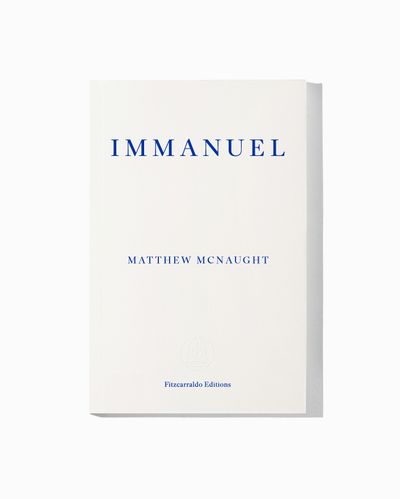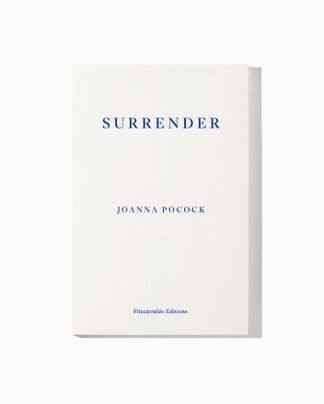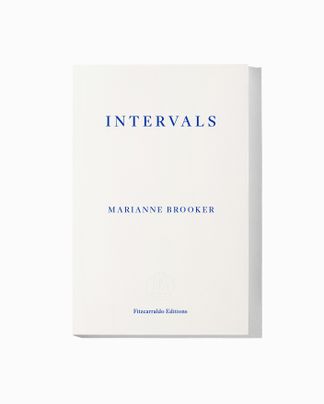At what point does faith turn into tyranny? In Immanuel, winner of the inaugural Fitzcarraldo Editions Essay Prize, Matthew McNaught explores his upbringing in an evangelical Christian community in Winchester. As he moved away from the faith of his childhood in the early 2000s, a group of his church friends were pursuing it to its more radical fringes. They moved to Nigeria to join a community of international disciples serving TB Joshua, a charismatic millionaire pastor whose purported gifts of healing and prophecy attracted vast crowds to his Lagos ministry, the Synagogue Church of All Nations (SCOAN). Years later, a number of these friends left SCOAN with accounts of violence, sexual abuse, sleep deprivation and public shaming.
In reconnecting with his old friends, McNaught realized that their journey into this cult-like community was directly connected to the teachings and tendencies of the church of their childhood. Yet speaking to them awakened a yearning for this church that, despite everything, he couldn’t shake off. Was the church’s descent into hubris and division separable from the fellowship and mutual sustenance of its early years? Was it possible to find community and connection without dogma and tribalism? Blending essay, memoir and reportage, Immanuel is an exceptional debut about community, doubt, and the place of faith in the twenty-first century.

Immanuel
French paperback with flaps, 247 pages
Published 8 June 2022
Immanuel
PREFACE
Immanuel was the sound of around a hundred people singing more or less in tune. It was baptisms in the River Itchen, picnics on the South Downs, praying in tongues in suburban living rooms.
Hebrew for ‘God with us’, Immanuel was a name uttered by the Prophet Isaiah, whose words were later recalled in Matthew’s gospel as evidence of Christ’s divinity: ‘Behold, the virgin will be with child and will give birth to a son, and she will call Him Immanuel.’ A bridge between the Old Testament and the New, Immanuel was God’s promise to His people, fulfilled.
Immanuel was a house church first, before expanding to fill a rented room in Winchester Guildhall and then the grand Georgian building that stood on the opposite side of the Broadway. Immanuel was the centre of the world once. Long after it imploded, its gravitational pull remains.
When friends visit me in Southampton, I soon run out of things in the city to show them, so I take them on the 30-minute train ride to Winchester. We walk down the paved High Street, passing cafés and boutiques, turn right at the Buttercross into the Cathedral grounds, then head towards the Water Meadows. I always feel, as we set out on this tourist walk, a tug towards the Broadway at the bottom end of town.
When I visit Winchester alone, I’m more likely to submit to it. I stand on the pavement of the Broadway, the statue of King Alfred behind me, and look up at St John’s House. The narrow lattice windows of the medieval undercroft. The broader windows of the assembly room above, and the painted ones of the non-existent third floor. I look for the paint pot and brushes on one of the windows of the top row, the trompe l’œil left in the nineties by Immanuel’s resident painter-decorator, along with his name on the pot: ‘Dave’. St John’s is closed to the public now. I walk away with my longing unfulfilled.
I was happy to learn that there was a name for this kind of place – one that captures the strange charge it possesses. A hierophany, according to the religious scholar Mircea Eliade, is a point where the membrane between the sacred and the mundane world seems at its thinnest, where the divine feels within closest reach. Some hierophanies are built structures: altars, temples, obelisks. Some are portable, like the prayer pole of a wandering tribe. Some are offered up by the natural world: the ancient oak, the mountain top. It might have some inherent quality of awe or beauty. It might be improvised or arbitrary. What matters is that people come together around these points; shared rituals and stories accumulate. The moment I came across the word, the places of a church childhood came to mind. The stone floor of the undercroft. The light green carpet of the assembly room.
These were spaces in which we gathered as a single body and called on God. For the most part, He eluded me. I spent far more time in church feeling frustrated, bored or out of place than I ever did giving full-hearted praise. The question of how He moved, and of what precisely He promised, would divide and scatter us. Some of us – myself included – would lose our faith altogether. Others would end up on the extreme fringes of evangelical Christianity. Yet division is not the feeling first evoked when I think of my hierophanies. Instead there is a sense – visceral, undiminished by the passing of time – of being part of this body which extended beyond me.
Other things bring on this feeling. Only YouTube knows about my late-night weakness for the old praise and worship songs that take me back to the assembly room. Lord, you have my heart. And I will search for yours. Jesus, take my life and lead me on. And meeting old church friends always feels different from, say, meeting friends from school. I ask after their families, and their names – ‘How’s Phil?’ ‘What’s Anna doing these days?’ – work a kind of spell that brings Immanuel fleetingly to life again.
I. EVERYONE NEEDS TO BE DELIVERED
In the video, TB Joshua walked along the front row, pressing the palm of his hand against each forehead he passed. A line of people collapsed in his wake, a cascade of Sunday dresses, football shirts, colourful West African fabrics. One woman cried out to him as he passed, her hands held up in supplication: ‘The devil is using the Bible to torment me!’ TB Joshua stopped. ‘How does the devil use the Bible?’
She took a dog-eared Bible from under her arm, and explained how she was compelled to consult the book before doing anything. She couldn’t cook, wash dishes or go out without its say-so. The woman was in her forties, hair tied back in a sensible ponytail, face taut with worry. ‘I have destroyed six Bibles by doing this,’ she said. Her husband stood beside her, looking down with a pained half-smile.
TB Joshua asked her to demonstrate how it worked. A leather handbag and a black shoulder bag were brought out and placed before her. ‘Here are two bags now,’ said TB Joshua. ‘You don’t know which one to carry, so ask!’
‘I’d pray,’ she said. ‘Oh Lord, open my eyes! Which bag should I carry?’ She opened her Bible at random. Her finger alighted on a passage. ‘His glory is like the firstling of his bullock,’ she read. ‘And his horns are like the horns of unicorns.’ She pointed to the leather handbag. ‘Then I would know, because…’
TB Joshua cut her off. ‘What does that say about this bag?’ A ripple of laughter from the congregation. The woman seemed exasperated by the question. ‘It says positive concerning this bag.’
He asked her to demonstrate going out. She put the Bible in the handbag and mimed a walk in her neighbourhood. The camera moved back as she made her way down the front row, stopping at imagined junctions to ask the Bible which way to go. Behind, TB Joshua looked on with a beatific smile, one arm folded across his chest, the other holding the microphone. Beyond him, a sea of congregants watched expectantly. Above them, the balconies, the mounted lights, the giant LED screens of the main auditorium of the Synagogue Church of All Nations, Lagos.
TB Joshua first entered my awareness as a curiosity: a sharp-suited, goatee-bearded Nigerian preacher on the chunky plastic cover of a VHS tape, which sat among books and audio-cassettes on the table at the back of the assembly room. It was the late nineties and I was in my teens. When I first watched the clips of his healings and exorcisms – which seemed to combine Billy Graham’s stadium evangelism with the kinetic drama of WWE wrestling – they provoked, above all, my burgeoning teenage scepticism. There was also a faint hope, a question hovering: what if this was the real deal? It was the remnant of a familiar anticipatory wonder that soon evaporated entirely. In the years that followed, my aversion to TB Joshua deepened and intensified. He came to personify the toxic, tyrannical potential of the Born Again Christianity I’d left behind. After I started writing about Joshua, and the confluence of forces that connected him with the church of my childhood, a kind of wonder returned. Not at the possibility of his anointing, but at his audacity, and the sheer unlikeliness of what he had achieved.
(…)
‘Matthew McNaught is a strong and welcome new voice in essayism, clear-sighted and hugely empathetic. In this deeply affecting account of his own spiritual journey, he weaves in and out of the byways of religious belief once known as “enthusiasm”, charting the body-shaking, mind-breaking experiences of friends and strangers alike. By turns cynical, doubtful, wounded and yearning, his words give astonishing shape to the space that only faith can fill.’
— Marina Benjamin, author of Insomnia
‘“Empathy” is a popular critical buzzword, but Matthew McNaught’s writing exemplifies the work of empathy at its most intense and, dare one say, sincere. Whether his subject is ordinary Syrians trapped by war or the fellow parishioners of his childhood church, ensnared by a false prophet, he always gives voice to the motives and emotions of those he writes about, mixed as they are and fraught with tragic consequence. McNaught is a sublime listener who knows how to put listening into words.’
— Marco Roth, author of The Scientists
‘Matthew McNaught’s Immanuel is a mesmerising and compelling trip to the very edges of faith. The author explores the seductive pull of radical belief systems that can lead followers towards communal joy, transcendence, human folly and, at times, brutality. Through his journey as a member of an evangelical Christian community in his youth to an adulthood of questioning the more extreme manifestations of this community in Nigeria, McNaught has created an expansive narrative that asks the fundamental questions around our need for faith and belonging whilst exploring their limits. Immanuel is a beautiful and important book.’
— Joanna Pocock, author of Surrender
‘This patient, absorbing account of evangelicalism in England and Pentecostalism in Nigeria neither romanticizes nor disdains religious belief. Instead, McNaught adopts friendship’s middle distance as the right vantage point from which to narrate his own spiritual history and that of childhood church friends who found themselves caught up in a cult. Neither indulgent nor disdainful toward believers, McNaught offers a fascinating look at how the search for ultimate meaning can go both wrong and right.’
— Emily Ogden, author of On Not Knowing: How to Love and Other Essays
‘Taking us on an unexpected journey from English suburbia to a Lagos megachurch, Immanuel offers a fascinating, empathetic glimpse into the extreme edges of evangelical Christianity.’
— Samira Shackle, author of Karachi Vice
‘The book is brilliantly crafted; McNaught moves deftly between incisive analysis of religions and cults, and an experiential free indirect style that takes the reader to the heart of the SCOAN compound. He frequently laments all he has lost since extricating himself from organized religion – a community, a shared identity, a coherent, overarching world-view … The nuance underpinning his work is anything but paralysing.’
— Lamorna Ash, TLS
‘Acknowledging the attractions of communal worship while being alert to its profound awkwardness is one of the things that Matthew McNaught does very well in Immanuel. The book is in part an account of his own experience growing up in Immanuel, a Christian community founded in Southampton in the 1970s. But it is also a journalistic investigation into the Synagogue Church of All Nations – or SCOAN – a Nigerian megachurch.… McNaught writes well about the social pressures of collective worship and the ways these have intensified in the age of the internet. He and his friends had a term for feeling compelled to appear slain in the spirit: the “courtesy drop”…. But despite all the fakery, despite the abuse and the charlatanism of SCOAN, McNaught is sensitive to the fact that charismatic churches appeal to values that lie beyond the reach of capitalism and contemporary politics.’
— Jon Day, London Review of Books
‘McNaught looks into his own relationship to his religious upbringing with nuance, in a blend of essay, memoir and reportage that asks us in turn to question what community and faith means today. Incredibly emotional, yet clear-eyed and generous.’
— Anna Cafolla, The Face
‘The most distinctive and admirable quality of this memoir is the way it bears witness to what McNaught calls the ”mixture of longing and dismay” he still feels in relation to his religious past.’
— Julia Dallaway, Oxonian Review
‘In elegant and patient prose, McNaught does an admirable job balancing introspective, tricky questions about his own faith, beliefs, and mistakes with deep empathy for those who, when their paths diverged, were enticed down a much different route.’
— Laura Waddell, The Scotsman
Matthew McNaught has written for the Guardian Long Reads and n+1. He lives in Southampton, where he works in mental health. He won the inaugural Fitzcarraldo Editions Essay Prize for Immanuel, his first book.




